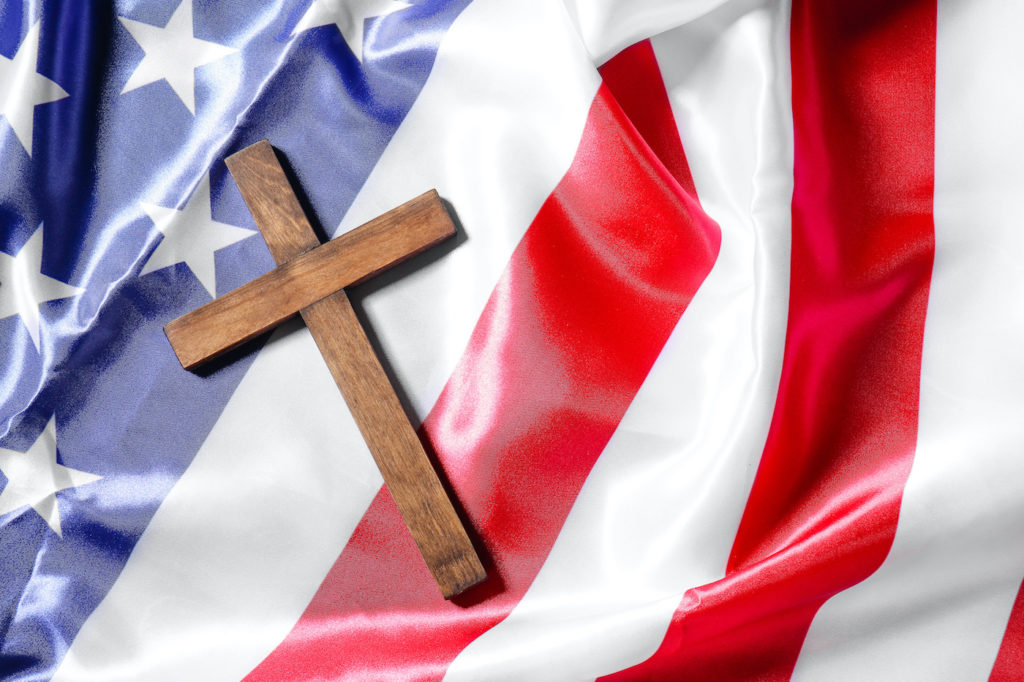In Part 1 of this review, I explained why I think Stephen Wolfe’s The Case for Christian Nationalism demonstrates a dilemma facing gifted Christian scholars. I also summarized his definition of the Christian nation and his theological justification for its unique characteristics. In this essay, I address what characterizes Wolfe’s Christian nation, distinguishing what is more consistent with the magisterial Protestant tradition from the book’s pernicious or less persuasive content.
Who is my Nation?
Wolfe’s Chapter 3 has drawn significant speculation and criticism. I attribute his shortcomings in this chapter to his being recklessly reactionary. Wolfe despises what he calls “psycho-sexual ethno-masochism” and “the liberal creedalist project.” The first term means collective guilt or shame by men as men, or Americans as Americans, for example. The second term refers to the presumption that liberal values like equality and democracy can and should be universally institutionalized. Wolfe is either perpetuating or identifying a paradox. On the one hand, the modern liberal is ashamed. On the other hand, he is arrogant enough to think that everyone holds his values.
Wolfe’s alternative to a universalist ethos and self-loathing is “natural affections,” which means loving rather than hating “one’s own” and not presuming that the values of one’s own community are everyone else’s. However, Wolfe neither anticipates, nor cares to anticipate, how he might be interpreted by those to his political right or left. His desire to incinerate “ethno narcissism” invites misunderstandings that could tempt conflagrations of racial segregation or supremacy. For example, he admits that explicitly dismissing “blood ties” as the basis of a nation could “save me some trouble.” But he declines to do so, shrugging this off as “fashionable” or “politically correct.” Whenever any author gives little thought to his readers, he and they are worse off.
Start your day with Public Discourse
Sign up and get our daily essays sent straight to your inbox.Against what Wolfe calls “the homogenizing forces of state capitalism” he proposes institutions and culture built on “a pre-reflective, pre-propositional love for one’s own, generated from intergenerational affections, daily life, and productive activity that links a society of the dead, living, and unborn.” During several pages of (admittedly) romantic phenomenological meanderings, Protestant sources disappear. Wolfe conflates nationality and ethnicity, but explicitly defines the latter not as race but as something “experienced.” One therefore cannot interpret him to mean “people that look like me,” unless similarly looking people have, for generations, toiled and lived alongside you. Careful readers will note that “ties of blood do not directly establish the boundaries of one’s ethnicity,” “we should not . . . disregard the work of intermarriage . . . in creating bonds of affection,” and (in a footnote) “this is not a white nationalist project.” All good, but when you get to “no nation . . . is composed of two or more ethnicities,” or rescinding citizenship for ethnic minorities, you still wince.
His desire to incinerate “ethno narcissism,” invites misunderstandings that could tempt conflagrations of racial segregation or supremacy.
Wolfe does not entirely leave aside arguments concerning Christianity here, though some of these are found in the subsequent Chapter 4 and should have been deployed in Chapter 3 to bolster his case. For example, he uses Christian sources to show that one can have benevolence (the wishing of another’s good) for mankind, but not beneficence (action effecting another’s good). He deploys an argument that echoes C. S. Lewis in Mere Christianity, though he does not make more careful application to a community: “Christianity perfects the whole but not by eliminating earthly particularity, just as any man who comes to Christ does not lose his personality and other unique characteristics.” Likewise, Wolfe has a short discussion of “stranger churches” in Reformation-era polities that gave refuge to Protestants fleeing persecution. Though host and guest shared similar religious convictions, their contrary languages and customs did not necessarily translate into agreeable economic or civil fellowship.
But Wolfe largely ignores other Christian implications for nationhood. It is certainly true that classical Protestant sources uniformly agree that technical/rational aspects of politics are not degraded by the Fall (e.g., Calvin in his Institutes, 2.2.12-18). But why aren’t the equally important affective aspects of political concord degraded by the Fall but improved by grace (John 13:34)? And while Wolfe demonstrates in Chapter 10 how prudence and experience opened boundaries of religious inclusion, why not likewise consider how experience and prudence could enlarge boundaries of ethnic inclusion?
America is an obvious case study here. Because Wolfe hates much of modern America, we can go back to George Washington’s warnings about regional sectionalism in 1796. America’s different regions at that time hardly constituted “one ethnicity,” and that was even prior to the westward expansion or addition of Acadians, Tejanos, or Californios, for example. Yet all these different “ethnicities” were knitted together (the Civil War not withstanding; it cannot be reduced to “ethnic differences”). Meanwhile, where there was greater homogeneity, in New England, for example, descendants discarded their ancestors’ civic values (including religious establishments) after only a few generations.
Meditating more deliberately on the possibility of civil concord, particularly in the Christian case, or the universality of the natural law, would have been more profitable than Wolfe’s despairing about ethno-masochism.
In short, homogeneity, prima facie, guaranteed the preservation of nothing. Heterogeneity, prima facie, guaranteed the destruction of nothing. Meditating more deliberately on the possibility of civil concord, particularly in the Christian case, or the universality of the natural law, would have been more profitable than Wolfe’s despairing about ethno-masochism.
What the Christian Nation Does and Doesn’t Do
Having established the dependence of nationhood on nature rather than some kind of transformative grace, Wolfe devotes Chapters 4–9 to fleshing out in more detail what is Christian about the Christian nation.
Part of Wolfe’s work in defining the Christian nation in these chapters is offense: defining what the Christian nation does do, primarily with what is outward. For example, provide public financial support for religious instruction or suppress public blasphemy. Neither is outside the bounds of contemporary American law, for example. Part of his task is defense: assuring the wary reader of what the Christian nation cannot do. For example, “Civil power cannot directly bring about spiritual good.”
Wolfe deftly deploys the classical Protestant Two Kingdoms distinction between what is inward (e.g., conscience or belief) and what is outward (e.g., words or actions). That distinction will be unfamiliar to almost all his readers, especially insofar as they’ve been taught that the arc of history bends only in the direction of religious pluralism, and that religious establishments are both barbaric and benighted. Regarding imposition on conscience, which relies heavily on the distinction between inward and outward, Wolfe’s Chapters 9 and 10 are superlative and merit my strongest endorsement. Their quality might be owed to the fact that Wolfe has none of the aforementioned “gynocratic” or “ethno-masochist” enemies to distract him. When his enemies are in the past, his work is always better.
Among Wolfe’s own tribe of traditional Protestants, he will have many objectors to his formulation of a Christian nation. This includes opponents of religious establishment or advocates for “transformation” (Neo-Calvinists), Theonomists who discard natural law, radical Two Kingdom advocates like David Van Drunen, or religious pluralists like David French or Russell Moore. Wolfe’s establishment will also provoke Baptists or other advocates for a “gathered church” ecclesiology in which only sincere believers attend worship. Wolfe’s ideological opponents on the political Right will include libertarians fearing “big government” and liberals who insist that there can and should be (a necessary distinction) legal and cultural neutrality on religious matters.
Wolfe addresses each, as well as those with pragmatic objections (e.g., “What if this kind of power fell into the wrong hands?”). I won’t recite Wolfe’s arguments, but his contrarian points include not confining harm to body and property (e.g., Jefferson’s point about the polytheist neither breaking his leg nor picking his pocket) or treating persons as essentially autonomous. To put it in contemporary social science terms, Wolfe’s opponents are essentially rational choice theorists. His understanding of human nature is more robust, resembling that of modern behavioral economists or Jonathan Haidt, for example.
Wolfe’s citizens have damnable souls, and their assent and action are formed by cues, preparation, encouragement, and discouragement from both law and culture. Wolfe is therefore not afraid of “cultural Christianity.” Surround people with every encouragement (rational and emotional) for beauty and you’ll get more of it, so said the ancients. Why should it be any different for godliness, or any less important? True, those conforming might not be truly faithful, but they’ll still be better off and less hostile to their faithful neighbors. On this point, Wolfe challenges Russell Moore, who blogged that “Bible Belt near-Christianity is teetering. I say let it fall.” Wolfe bluntly and correctly objects to Moore’s cynical piety: “The absence of cultural Christianity has brought hostility, not religious neutrality.” Likewise, Wolfe critiques megachurches trying to build parallel civil societies with their own Christian coffee bars and sports programs while insisting on pluralism shaping those outside their churches.
A Christian Prince?
Disappointingly, Wolfe’s romantic and reactionary thinking returns in his call for a “Christian Prince” in Chapter 7: a ruler embodying “a measured and theocratic Caesarism . . . who brings a Christian people to self-consciousness and who, in his rise, restores their will for their good.” Some of this chapter draws soundly on classical Two Kingdom theology, drawing boundaries of civil and ecclesiastical power or elevating the civil magistrate. But Wolfe leaves aside the entire constitutional tradition that early Protestants not only conserved from their medieval and ancient predecessors but enhanced considerably. He again drifts into vague romanticism, calling for a figurehead of “manly, moral liberty” who can lead the army or a harvest festival while combatting the gynocracy’s “toxic-feminine conditions of empowerment.”
Wolfe does not altogether ignore accountability, even election, for his prince, but he cares little for two hundred years of consistent Protestant preference for a republic or aristocratic mixed regime. Consider, for example, Calvin’s warning that “it very rarely happens that kings so rule themselves as never to dissent from what is just and right, or are possessed of so much acuteness and prudence as always to see correctly.” Wolfe should be Johannes Althusius, carefully articulating institutions of accountability, but he sounds more like Althusius’s adversary Jean Bodin who cared little for monarchical accountability. Wolfe has no censors, ephors, or estates, for example, as Protestant constitutionalists advocated to represent the interests of the people (literally, elect the king). Wolfe’s prince looks more like the “mere monarchy” that Scottish reformer John Knox criticized as unaccountable.
Wolfe does not altogether ignore accountability, even election, for his prince, but he cares little for two hundred years of consistent Protestant preference for a republic or aristocratic mixed regime.
Christian Revolution
Likewise, Wolfe’s departure from his Protestant sources is evident in Chapter 8, both weakening his argumentation and undermining the Christian character of his project. I understand Wolfe to be arguing for the justice of violent revolution in America. He suggests that such action may not be prudent (not potentially successful?), and therefore deferrable. But he emphatically denies being “edgy,” and has no desire to “suppress the spirit of action.”
Prior to this startling passage, Wolfe provides a reasonably accurate summary of many points in Protestant resistance theory, but the weakest section is his definition of tyranny —what he needs most to justify resistance. What Wolfe omits is that Protestant resistance theory identified a tyrant classically: one who violated or appropriated the law in egregious or harmful ways. They added to this that insofar as God invested rulers with authority, and the people joined them in covenant before God, a tyrant was defined by commanding what God prohibited or prohibiting what God commanded. There was general consensus that “idolatrous” (Roman Catholic) rulers were therefore tyrants, especially if they persecuted Protestants. And yet, proposals for Protestant uprisings against Catholic monarchies in Scotland and France got tepid responses from Calvin and Heinrich, who were de facto international Protestant leaders.
Wolfe doesn’t offer a careful identification of America’s tyrant, only what he considers a psychological capture of American Christians by progressive liberals and their stooges, the “regime evangelicals,” pushing liberalism via Hollywood, HR directors, public health officials, et al. that he characterizes as a de facto occupation. Wolfe even advocates that a minority of Christians seize power in a revolution, if prudent. But if there wasn’t a Protestant consensus to overthrow persecuting Catholic rulers, one cannot imagine them literally throwing HR directors out the window as if Protestants became Maoists.
Wolfe is so despairing, again, that he ignores what his Protestant sources said again and again: even the most unjust tyrant is a judgment of God on His people and necessitates repentance. Calvin, for example, said that we should “first call up remembrance of our faults” through self-examination. Even the more radical Christopher Goodman urged those governed by religious enemies to repent and “turn again unto the Lord.” Knox said of Catholic rulers that God justly “punished the proud rebellion and horrible ingratitude of the realms of England and Scotland.” A call to repentance or prayer would not preclude action, but it would certainly force necessary and prudent reflection about the very problems Wolfe diagnoses and what the first response should be. Creating a deplorables basket of enemies on the political Left, while ignoring spiritual enemies, makes the project more political for sure, but not more Christian.
Wolfe is so despairing, again, that he ignores what his Protestant sources said again and again: even the most unjust tyrant is a judgment of God on His people and necessitates repentance.
Twitter Red Pill or Political Treatise?
Wolfe’s concern with psychological capture by “the regime” is more than an unpersuasive positing of a tyrant, however. He reflects the political ethos of those on the Right and Left who have abandoned enlightening for awakening. While enlightenment is the way of the treatise, desiring allies among the rational, awakening is the way of the tweet, desiring to make everyone irascibile. Neither approach will abide the other.
Which should the Christian choose, especially in our hair-trigger environment? This is the dilemma evident throughout Wolfe’s book: do Christians have more confidence in our tradition and the God whom we consider its author, or in our outrage?













